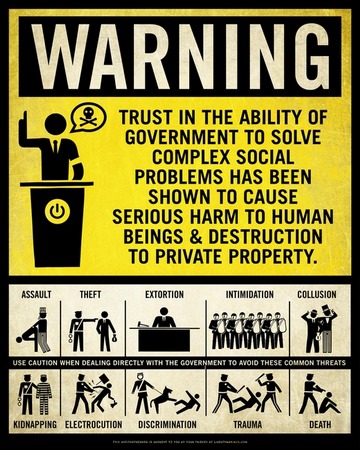Today is Labor Day, the day we supposedly recognize the efforts of the labor movement for the current working conditions we now enjoy. What is lacking, in my opinion, in the discussion about the influence of the labor movement on today’s working environment is why the labor movement occurred at all. Ironically the labor movement was a result of centralization. I say it’s ironic because the labor movement is often tied heavily to collectivism, which is one of the most centralist philosophies out there.
The labor movement can be summarized as workers using various tactics in an attempt to coerce better working conditions out of their employers. Strikes, protests, and outright sabotage of employer facilities were used by employees to cause enough headaches for their employer to convince him or her to grant more compensation to the workers. Why were such coercive tactics chosen? Many inside the labor movement claim such tactics were necessary because the employees had no other option. Lacking the necessary capital to start a competing business the employees were, what the left often call, wage slaves. This claim isn’t false, but the labor movement ended up blaming the wrong people for their predicament.
Employers received a brunt of the blame while the labor movement attempted to use their actual enemy, the state, to achieve their desired ends. A major failure of the labor movement was incorrectly identifying the party responsible for the anticompetitive environment of the day. Why were workers cast into a life of dependency? The answer lies in the state’s centralization in the form of monopoly privileges to those in its favor. Benjamin Tucker identified four state monopolies: the money monopoly, the land monopoly, the tariff monopoly, and the patent monopoly.
The money monopoly requires individuals to acquire enough state currency to, at minimum, pay any taxes, fines, and fees issued to them by the state. Through legal tender laws the state is able to coerce individuals into using the state’s money. This greatly restricts options such as subsistence farming or trading goods other than state issued money. It is no coincidence that the first receivers of issued money are the banks and the banks tend to lend that money primarily to currently established employers. This ensures that individuals interested in acquiring state issued currency must get it from an employer. Effectively one becomes dependent on an employer for their very survival because failing to pay taxes, fines, and fees to the state in its issued money can result in dire consequences.
The land monopoly is, perhaps, one of the more consequential to workers. As is sits the state has a claimed monopoly on land and anyone wanting to obtain land must either purchase it from a current holder or the state. Even virgin soil claimed by no man cannot to put to use without the state’s permission. This creates a barrier to entry for anybody wanting to construct a building or extract resources. Whereas workers could have the option of claiming unowned land and extracting resources for sale, that option has been removed by the state. In order to enter a business one must have enough extra capital to purchase land from the state and comply with all of its regulations concerning the use of that land (zoning laws, for example, restrict the uses land can be put towards).
Then there is the tariff monopoly. By implementing artificial price increases on imported goods the state ensures two things: prices for affected goods remain artificially high and anybody wanting to involve themselves in the business of trade, which requires less capital than producing, are at a disadvantage. Another option is removed from workers seeking to make their own way instead of relying on wages received from their employer.
Finally we have the patent monopoly. The monopoly on ideas is perhaps second to the land monopoly when it comes to detrimentally affecting laborers. In the absence of patent monopolies an employee unsatisfied with his or her current working conditions could take their knowledge received from working their current job and use it to compete with their employer. Who better to compete with an automobiles producer than individuals who have been building automobiles? The threat of employees leaving to found competing businesses is a powerful motivator for employers. If the compensation offered to employees isn’t sufficient in their eyes they can depart to start a competing business, leaving the employer without trained employees and facing competition from trained competitors.
Through the state’s interfere in the free market the employers hold great advantage over employees. Entering the market is difficult so employees are left at the mercy of employers. Unions and politicians both exploit this fact to their favors. While the unions propagandize employees into believing their only option to get by in the world is to join together in dues paying unions the politicians propagandize employees into supporting their party during the next election cycle. Individuals running the unions are able to collect money from member dues for, effectively, schmoozing politicians. Meanwhile the politicians collect money from campaign contributions and free labor from campaign volunteers. Both the unions and the politicians work together to ensure the status quo that keeps them both employed is maintained.
Today refrain of thanking unions, the labor movement, and supposedly labor friendly politicians for the working conditions you now enjoy. Instead condemn the state from putting you at a disadvantage when it comes to negotiating with your employer for better working conditions. It is unlikely that the labor movement would have even been necessary if it wasn’t for the state’s claimed monopolies.

